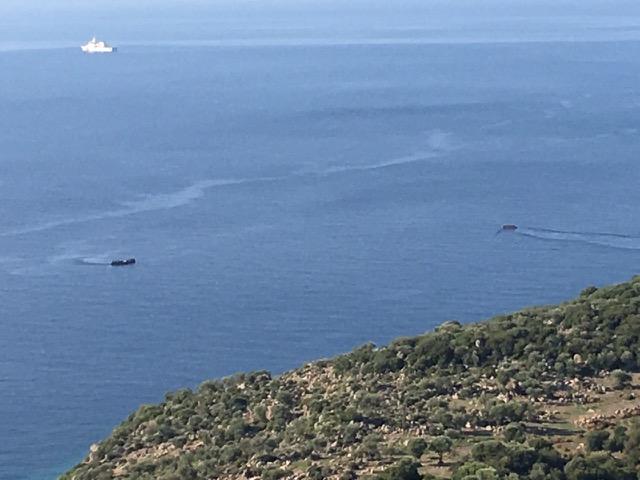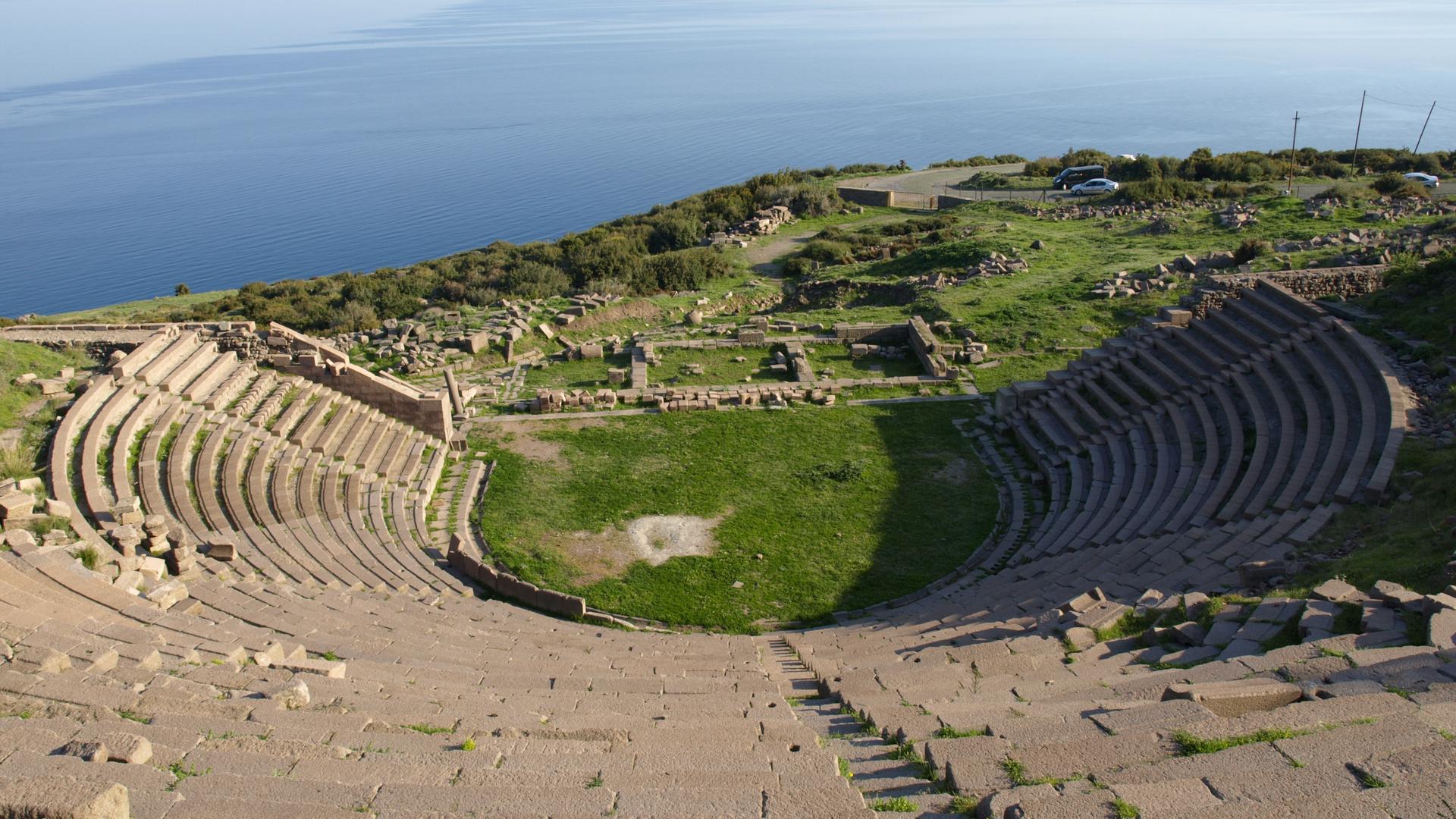This beautiful Turkish tourist town is now home to boats stuffed with refugees and migrants headed for Lesbos
The ancient Theatre of Assos overlooking the Aegean Sea, with the nearby island of Lesbos on the horizon.
Staring out from the high cliffs above the ancient Greek city of Assos in Turkey, now a beautiful tourist town, your vision merges with the vast blueness of the sky and Aegean Sea until it rests on the melodious green hills of the island of Lesbos in the distance. It’s a grand view that has captivated people for millennia.
Aristotle lived there for a time before leaving for Lesbos, where he and Theophrastus did seminal work classifying flora and fauna.
Today it’s also an excellent vantage point to observe boats stuffed with refugees and migrants from Syria, Iraq, Afghanistan and other nations leaving from camps run by the Turkish mafia. They are bound for Lesbos, only five miles away at the closest point. On the other side, a ragged group of NGOs, foreign and local volunteers and international media await them with long camera lenses, hugs and, if they’re lucky, some water, pieces of fruit and dry clothing.
The day I arrived in Assos to meet Peter Bouckaert of Human Rights Watch, some 50 boats carrying 3,500 refugees would reach Lesbos, adding to the 400,000 who have passed through Greece this year — 100,000 in August alone. Most of the Lesbos-bound boats left from five camps tucked into the pretty olive groves that dot the shoreline around Assos.
Although the scenery could not be more stunning, the situation is grim for the refugees in those camps who must do business with the traffickers in order to cross the Aegean and enter Europe with the hope of getting asylum.
According to accounts from many refugees who have made the journey, as well as that of Bouckaert’s translator, a 25-year-old Palestinian Syrian woman who herself several months ago paid a smuggler and got into a boat bound for Greece (they never made it), refugees are promised a safe passage but then subjected to hazardous conditions and threatened with violence and loss of money if they don’t go along. Meanwhile the mafia is getting rich.
We wanted to attempt to see a camp, so Rowan, our translator, told a Turkish trafficker in Assos that she would pay $500 to get on a boat of Syrian refugees leaving in the morning. She said that Bouckaert was her boyfriend and I was his sister. As she negotiated with the man they had made contact with the day before in her rough Turkish, we hoped we would be able to walk with him to the camp at the beach; then she would decide not to go. But he rapidly grew agitated and after a few minutes hurried away, as did we.
We were on a dirt road not far from the tourist village by the sea. Cars passed by, some obviously tourists headed to the ruins of the Temple of Athena, others in luxury cars appeared to be spotters involved in the trafficking operation; a few taxis dropped off what we believed to be refugees looking to get on a boat.
Sitting for a while in a small parking lot on a high hill not far from where we had met the trafficker, we watched the smuggling boats appear on the sea from the camps hidden below. It was about 9 a.m. and in half an hour we saw three, then four, then seven, then eight — all jammed with about 60 people. The flimsy inflatable dinghies, made expressly for these one-way trafficking trips, often leak and sink easily.
“It’s very brutal when they put people on the boats,” Bouckaert said. “When they pay in Izmir or wherever, the smugglers promise there will only be 30 or 35 on a boat. When they see there are 50 or 60 they get scared. The traffickers are armed with guns and knives and even cattle prods. They force them onto the boats.”
Two of the boats stalled about half a mile off shore — the cheap engines frequently fail, leaving refugees stranded — and floated uneasily. Others chugged in a slow, steady path toward Lesbos, passing not far from the large Turkish Coast Guard vessel stationed about a mile off shore with a commanding view of the proceedings.

One of the stalled boats headed back toward shore and out of view. We couldn’t see the beach but we heard terrible cries of distress — men shouting and the keening of women’s voices. Rowan remembered the night the boat she and her sister were in — crammed with men, women and small children — crashed on the rocks and broke. It was 2 a.m.
“We had to come back and the smugglers beat us and tried to force us back on the boat,” she said. “We were shouting and screaming in panic.”
“There were seven kids in your boat, right Rowan?” Bouckaert added. “And they didn’t even have life jackets on?”
“Exactly," she said. "The parents were hysterical. We screamed and cried just like what we’re hearing now. After hours, they abandoned us on the beach and we lost our money — $1,200 each. We didn’t even know where we were.”
“They get about $60,000 per boat,” Bouckaert said, counting up the boats we’d seen leave from our vantage point that morning. “Twenty boats so far. That’s $1.2 million before noon for the Turkish mafia.” By the end of the day it would be $3 million from traffic to Lesbos alone.
We drove down another dirt road near Assos where we thought we might be able to observe a different camp, but were turned around by two men on a tractor, one of whom had a new military style rifle on his shoulder. Later we would find out that the camp was for Afghans.
The camps tend to be grouped somewhat by nationality with Syrian, Iraqi and Afghan middle men or collectors in Istanbul and Izmir recruiting refugees largely from their own countries. We were told by traffickers that in Assos, the boats of Syrians leave first in the morning, then other groups follow.
It was a glorious, sunny October day — if it weren’t for the trafficking operation going on all around us it would have felt like a dream vacation. People were enjoying fresh sea food lunches at outdoor tables lining the harbor. A wedding procession wove down the narrow village streets.
Frustrated that we couldn’t get a better look at the camps, we decided to hire a small Zodiac with a local pilot to look around by sea. We pulled away from picturesque Assos harbor, heading north just a little way off shore, and soon had a clear view of three camps in coves very near the village. In the end we would spot five within about a mile of Assos.
We watched as men, probably traffickers, carried large white styrofoam boxes — the engines — down from a road above. The hillsides were littered with the packaging.
Then, out of the olive grove, a group of about 50 refugees, many in orange life jackets, walked down the beach. Some men carried one of the long black dinghies high over their heads and put it in the water. We had no idea how many people were waiting for their turn. Buses and trucks arrive from Istanbul and Izmir by the dozens every night and deposit the refugees at drop off points. They must walk in the dark with their children to these “camps” with no facilities where, when their turn comes, they will be shoved into a boat, sometimes separated from their loved ones to balance the weight, and sent off.
We keep a prudent distance of perhaps 200 yards offshore. When a Danish TV crew walked directly into the camp the following day, the traffickers beat them badly and destroyed their camera and SD card.
In Izmir last week, I spoke to many Syrian refugees who were waiting to leave in buses for a trafficking camp somewhere along the Turkish coast. When they arrive, they are not told where they are. They only know their destination — Lesbos or Chios or Kos — as they are put to sea, if then.
No one wanted to make this dangerous boat crossing. Most people are connected to the Internet. Most have smart phones and even showed me videos that friends who had already crossed had sent them of the dangerous crowding and scary conditions. These people know very well what they’re getting themselves and their families into. But given the war at home, they feel they have no other choice.
Bouckaert, who has been with Human Rights Watch for 20 years, believes that most, although not all, of the people crossing the Aegean are conflict refugees and deserve safe haven. “People should not have to risk their lives to claim asylum in Europe,” he said.
We saw another boat take off and Bouckaert asked our pilot to go up alongside. It appeared to be a group of about 60 Afghans with almost no life jackets in the group. When Bouckaert shouted hello, a couple men waved but their eyes were locked ahead — toward Lesbos. We had cameras and they had no idea who we were.
They didn’t want any trouble.
Jeanne Carstensen is reporting on the refugee crisis in Lesbos, Greece with support from the Pulitzer Center on Crisis Reporting.
